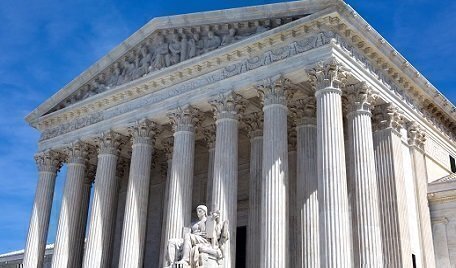Declaring that highly placed government officials cannot be sued personally for wrongdoing in the name of national security, a divided Supreme Court on Monday spared three former top Justice Department officials from legal claims based on mistreatment of Muslims rounded up in the wake of the 9/11 terrorist attacks.
 It is up to Congress to decide whether to allow damage lawsuits for constitutional harms in response to security threats, and it has never done so, the court declared in a ruling that came a full generation after those attacks. The vote was 4-to-2 because three Justices did not take part. Six is the minimum number of Justices it takes to make a final decision by the court. For the first time in this court term, one of the dissenting Justices protested by reciting aloud his objections.
It is up to Congress to decide whether to allow damage lawsuits for constitutional harms in response to security threats, and it has never done so, the court declared in a ruling that came a full generation after those attacks. The vote was 4-to-2 because three Justices did not take part. Six is the minimum number of Justices it takes to make a final decision by the court. For the first time in this court term, one of the dissenting Justices protested by reciting aloud his objections.
Insulated from legal liability, in lawsuits filed by six Muslim men who had been held in harsh conditions for up to eight months, were former U.S. Attorney General John Ashcroft, former FBI Director Robert Mueller, and former Immigration Commissioner, James Ziglar, and two wardens at a federal jail in New York City.
In the days following the terrorist assaults that killed thousands in the World Trade Center in New York City, the Pentagon in Washington, D.C., and in a failed attempt to attack the Capitol building in Washington, federal agents rounded up hundreds of Muslim men who were living in the U.S. illegally, as possible terrorists. They were held in a detention center in New York City, and underwent severe punishment and harsh conditions for months.
All of the men involved were deported. Later, six of them filed lawsuits directly against top Justice Department officials and two wardens at the center, claiming a variety of constitutional violations during their detention. (Because they were in the country illegally, they could not sue to challenge their initial or continued detention, but did have a right to sue over the conditions under which they were held in captivity.)
Federal law allows damage lawsuits against state and local officials personally, if they violate someone’s constitutional rights in the line of duty. Congress has never passed such a law for federal officials, but the Supreme Court in a famous 1971 decision ruled for the first time that a direct lawsuit may be pursued for such constitutional violations.
In the years since, the court has seldom expanded that right, but the new case before the Supreme Court was an attempt by the six Muslim men to sue for the conditions during their captivity. After a lower court allowed their claims to go forward, the officials involved took the case on to the Supreme Court, resulting in the decision ending the case.
Justice Anthony M. Kennedy, writing for the majority, spelled out the limited opportunity that individuals have to file such direct claims for federal officials’ wrongdoing, and found that this lawsuit did not qualify.
Saying that times have changed in the federal courts since such direct lawsuits were permitted, the main opinion said that those courts now use the greatest caution in expanding the opportunity to sue. But, for the first time, the court used the new case on Monday to declare essentially off-limits such a lawsuit when it would compel the court to look into the reasons why federal officials pursue a particular policy in response to a perceived threat to national security.
That is a field, Justice Kennedy said, that the Constitution leaves largely to Congress and the Executive Branch, not the courts.
Congress, the opinion noted, has had nearly 16 years since the 9/11 attacks and the actions of government officials in response to consider whether to authorize lawsuits against such officials, and chose not to pass such a law.
The Kennedy opinion was joined by Chief Justice John G. Roberts, Jr., and Justices Samuel A. Alito, Jr., and Clarence Thomas.
Justice Stephen G. Breyer took the somewhat unusual step of reciting at length from the bench the dissenting opinion he wrote for himself and Justice Ruth Bader Ginsburg.
Justice Sonia Sotomayor did not take part because she has some contact with the case in her former role as a federal appeals court judge, and Justice Elena Kagan stayed out of it because she played some role in an earlier stage of the case when she was U.S. Solicitor General.
The new Justice, Neil M. Gorsuch, took no part because the case arose before he had joined the court.
Legendary journalist Lyle Denniston is Constitution Daily’s Supreme Court correspondent. Denniston has written for us as a contributor since June 2011 and has covered the Supreme Court since 1958. His work also appears on lyldenlawnews.com.







